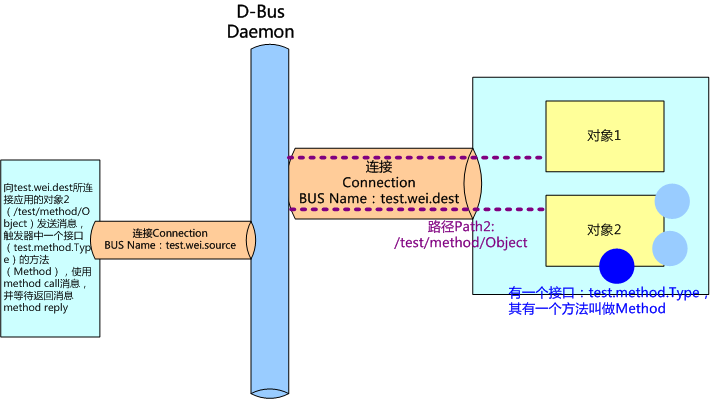[转] D-Bus学习(六):Method的收发小例子
From: http://blog.csdn.net/flowingflying/article/details/5455327
我们继续学习D-Bus,参考http://dbus.freedesktop.org/doc/dbus/libdbus-tutorial.html ,相关的API接口reference参考http://dbus.freedesktop.org/doc/dbus/api/html/modules.html 。从底层,即libdbus学习如何发送Method以及如何等待应答,在上上次学习中,给出了同步的方式,这是更为高层的处理方式,建议使用。监听method和监听signal的方式非常相似。在给出例子之前,我希望和上次学习一样给出一个示意图,更好地了解D-Bus的各个概念。

监听Method call消息,并返回Method reply消息
Method的监听和signal的监听的处理时一样,但是信号是不需要答复,而Method需要。在下面的例子中,我们将学习如何在消息中加入多个参数(在D-Bus学习(四)中,我们加入了一个参数)的情况。
#include <stdio.h>
#include <stdlib.h>
#include <string.h>
#include <dbus/dbus-glib.h>
#include <dbus/dbus.h>
#include <unistd.h>
/*读取消息的参数,并且返回两个参数,一个是bool值stat,一个是整数level*/
void reply_to_method_call(DBusMessage * msg, DBusConnection * conn){
DBusMessage * reply;
DBusMessageIter arg;
char * param = NULL;
dbus_bool_t stat = TRUE;
dbus_uint32_t level = 2010;
dbus_uint32_t serial = 0;
//从msg中读取参数,这个在上一次学习中学过
if(!dbus_message_iter_init(msg,&arg))
printf("Message has no args/n");
else if(dbus_message_iter_get_arg_type(&arg) != DBUS_TYPE_STRING)
printf("Arg is not string!/n");
else
dbus_message_iter_get_basic(&arg,& param);
if(param == NULL) return;
//创建返回消息reply
reply = dbus_message_new_method_return(msg);
//在返回消息中填入两个参数,和信号加入参数的方式是一样的。这次我们将加入两个参数。
dbus_message_iter_init_append(reply,&arg);
if(!dbus_message_iter_append_basic (&arg,DBUS_TYPE_BOOLEAN,&stat)){
printf("Out of Memory!/n");
exit(1);
}
if(!dbus_message_iter_append_basic (&arg,DBUS_TYPE_UINT32,&level)){
printf("Out of Memory!/n");
exit(1);
}
//发送返回消息
if( !dbus_connection_send (conn, reply, &serial)){
printf("Out of Memory/n");
exit(1);
}
dbus_connection_flush (conn);
dbus_message_unref (reply);
}
/* 监听D-Bus消息,我们在上次的例子中进行修改 */
void listen_dbus()
{
DBusMessage * msg;
DBusMessageIter arg;
DBusConnection * connection;
DBusError err;
int ret;
char * sigvalue;
dbus_error_init(&err);
//创建于session D-Bus的连接
connection = dbus_bus_get(DBUS_BUS_SESSION, &err);
if(dbus_error_is_set(&err)){
fprintf(stderr,"Connection Error %s/n",err.message);
dbus_error_free(&err);
}
if(connection == NULL)
return;
//设置一个BUS name:test.wei.dest
ret = dbus_bus_request_name(connection,"test.wei.dest",DBUS_NAME_FLAG_REPLACE_EXISTING,&err);
if(dbus_error_is_set(&err)){
fprintf(stderr,"Name Error %s/n",err.message);
dbus_error_free(&err);
}
if(ret != DBUS_REQUEST_NAME_REPLY_PRIMARY_OWNER)
return;
//要求监听某个singal:来自接口test.signal.Type的信号
dbus_bus_add_match(connection,"type='signal',interface='test.signal.Type'",&err);
dbus_connection_flush(connection);
if(dbus_error_is_set(&err)){
fprintf(stderr,"Match Error %s/n",err.message);
dbus_error_free(&err);
}
while(true){
dbus_connection_read_write (connection,0);
msg = dbus_connection_pop_message (connection);
if(msg == NULL){
sleep(1);
continue;
}
if(dbus_message_is_signal(msg,"test.signal.Type","Test")){
if(!dbus_message_iter_init(msg,&arg))
fprintf(stderr,"Message Has no Param");
else if(dbus_message_iter_get_arg_type(&arg) != DBUS_TYPE_STRING)
g_printerr("Param is not string");
else
dbus_message_iter_get_basic(&arg,&sigvalue);
}else if(dbus_message_is_method_call(msg,"test.method.Type","Method")){
//我们这里面先比较了接口名字和方法名字,实际上应当现比较路径
if(strcmp(dbus_message_get_path (msg),"/test/method/Object") == NULL)
reply_to_method_call(msg, connection);
}
dbus_message_unref(msg);
}
}
int main( int argc , char ** argv){
listen_dbus();
return 0;
}
发送Method call消息,并等待Method reply消息
下面的例子在上次学习信号发送的例子上进行修改。如下:
#include <stdio.h>
#include <stdlib.h>
#include <string.h>
#include <dbus/dbus-glib.h>
#include <dbus/dbus.h>
#include <unistd.h>
//建立与session D-Bus daemo的连接,并设定连接的名字,相关的代码已经多次使用过了
DBusConnection * connect_dbus(){
DBusError err;
DBusConnection * connection;
int ret;
//Step 1: connecting session bus
/* initialise the erroes */
dbus_error_init(&err);
/* Connect to Bus*/
connection = dbus_bus_get(DBUS_BUS_SESSION, &err);
if(dbus_error_is_set(&err)){
fprintf(stderr,"Connection Err : %s/n",err.message);
dbus_error_free(&err);
}
if(connection == NULL)
return NULL;
//step 2: 设置BUS name,也即连接的名字。
ret = dbus_bus_request_name(connection,"test.wei.source",DBUS_NAME_FLAG_REPLACE_EXISTING,&err);
if(dbus_error_is_set(&err)){
fprintf(stderr,"Name Err : %s/n",err.message);
dbus_error_free(&err);
}
if(ret != DBUS_REQUEST_NAME_REPLY_PRIMARY_OWNER)
return NULL;
return connection;
}
void send_a_method_call(DBusConnection * connection,char * param)
{
DBusError err;
DBusMessage * msg;
DBusMessageIter arg;
DBusPendingCall * pending;
dbus_bool_t * stat;
dbus_uint32_t * level;
dbus_error_init(&err);
//针对目的地地址,请参考图,创建一个method call消息。 Constructs a new message to invoke a method on a remote object.
msg = dbus_message_new_method_call ("test.wei.dest","/test/method/Object","test.method.Type","Method");
if(msg == NULL){
g_printerr("Message NULL");
return;
}
//为消息添加参数。Append arguments
dbus_message_iter_init_append(msg, &arg);
if(!dbus_message_iter_append_basic (&arg, DBUS_TYPE_STRING,¶m)){
g_printerr("Out of Memory!");
exit(1);
}
//发送消息并获得reply的handle 。Queues a message to send, as with dbus_connection_send() , but also returns a DBusPendingCall used to receive a reply to the message.
if(!dbus_connection_send_with_reply (connection, msg,&pending, -1)){
g_printerr("Out of Memory!");
exit(1);
}
if(pending == NULL){
g_printerr("Pending Call NULL: connection is disconnected ");
dbus_message_unref(msg);
return;
}
dbus_connection_flush(connection);
dbus_message_unref(msg);
//waiting a reply,在发送的时候,已经获取了method reply的handle,类型为DBusPendingCall。
// block until we recieve a reply, Block until the pending call is completed.
dbus_pending_call_block (pending);
// get the reply message,Gets the reply, or returns NULL if none has been received yet.
msg = dbus_pending_call_steal_reply (pending);
if (msg == NULL) {
fprintf(stderr, "Reply Null/n");
exit(1);
}
// free the pending message handle
dbus_pending_call_unref(pending);
// read the parameters
if (!dbus_message_iter_init(msg, &arg))
fprintf(stderr, "Message has no arguments!/n");
else if ( db us_message_iter_get_arg_type (&arg) != DBUS_TYPE_BOOLEAN)
fprintf(stderr, "Argument is not boolean!/n");
else
dbus_message_iter_get_basic (&arg, &stat);
if (!dbus_message_iter_next(&arg))
fprintf(stderr, "Message has too few arguments!/n");
else if ( db us_message_iter_get_arg_type (&arg) != DBUS_TYPE_UINT32 )
fprintf(stderr, "Argument is not int!/n");
else
dbus_message_iter_get_basic (&arg, &level);
printf("Got Reply: %d, %d/n", stat, level);
dbus_message_unref(msg);
}
int main( int argc , char ** argv){
DBusConnection * connection;
connection = connect_dbus();
if(connection == NULL)
return -1;
send_a_method_call(connection,"Hello, D-Bus");
return 0;
}


